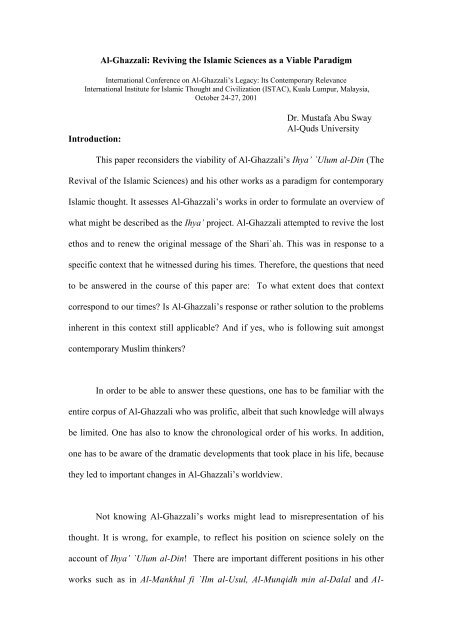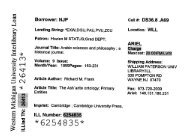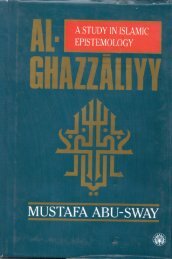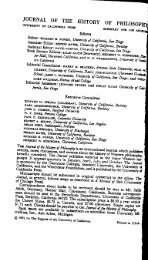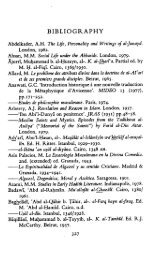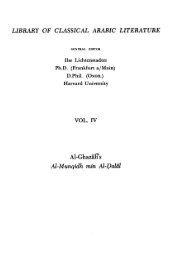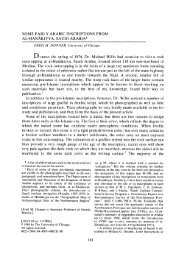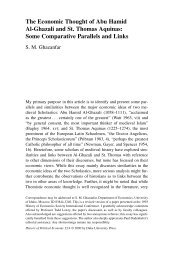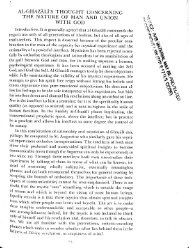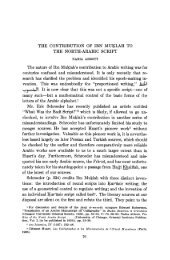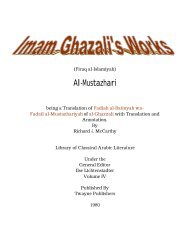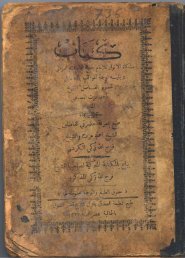Al-Ghazzali: Reviving the Islamic Sciences as a Viable Paradigm Dr ...
Al-Ghazzali: Reviving the Islamic Sciences as a Viable Paradigm Dr ...
Al-Ghazzali: Reviving the Islamic Sciences as a Viable Paradigm Dr ...
You also want an ePaper? Increase the reach of your titles
YUMPU automatically turns print PDFs into web optimized ePapers that Google loves.
<strong>Al</strong>-<strong>Ghazzali</strong>: <strong>Reviving</strong> <strong>the</strong> <strong>Islamic</strong> <strong>Sciences</strong> <strong>as</strong> a <strong>Viable</strong> <strong>Paradigm</strong><br />
International Conference on <strong>Al</strong>-<strong>Ghazzali</strong>’s Legacy: Its Contemporary Relevance<br />
International Institute for <strong>Islamic</strong> Thought and Civilization (ISTAC), Kuala Lumpur, Malaysia,<br />
October 24-27, 2001<br />
Introduction:<br />
<strong>Dr</strong>. Mustafa Abu Sway<br />
<strong>Al</strong>-Quds University<br />
This paper reconsiders <strong>the</strong> viability of <strong>Al</strong>-<strong>Ghazzali</strong>’s Ihya’ `Ulum al-Din (The<br />
Revival of <strong>the</strong> <strong>Islamic</strong> <strong>Sciences</strong>) and his o<strong>the</strong>r works <strong>as</strong> a paradigm for contemporary<br />
<strong>Islamic</strong> thought. It <strong>as</strong>sesses <strong>Al</strong>-<strong>Ghazzali</strong>’s works in order to formulate an overview of<br />
what might be described <strong>as</strong> <strong>the</strong> Ihya’ project. <strong>Al</strong>-<strong>Ghazzali</strong> attempted to revive <strong>the</strong> lost<br />
ethos and to renew <strong>the</strong> original message of <strong>the</strong> Shari`ah. This w<strong>as</strong> in response to a<br />
specific context that he witnessed during his times. Therefore, <strong>the</strong> questions that need<br />
to be answered in <strong>the</strong> course of this paper are: To what extent does that context<br />
correspond to our times? Is <strong>Al</strong>-<strong>Ghazzali</strong>’s response or ra<strong>the</strong>r solution to <strong>the</strong> problems<br />
inherent in this context still applicable? And if yes, who is following suit amongst<br />
contemporary Muslim thinkers?<br />
In order to be able to answer <strong>the</strong>se questions, one h<strong>as</strong> to be familiar with <strong>the</strong><br />
entire corpus of <strong>Al</strong>-<strong>Ghazzali</strong> who w<strong>as</strong> prolific, albeit that such knowledge will always<br />
be limited. One h<strong>as</strong> also to know <strong>the</strong> chronological order of his works. In addition,<br />
one h<strong>as</strong> to be aware of <strong>the</strong> dramatic developments that took place in his life, because<br />
<strong>the</strong>y led to important changes in <strong>Al</strong>-<strong>Ghazzali</strong>’s worldview.<br />
Not knowing <strong>Al</strong>-<strong>Ghazzali</strong>’s works might lead to misrepresentation of his<br />
thought. It is wrong, for example, to reflect his position on science solely on <strong>the</strong><br />
account of Ihya’ `Ulum al-Din! There are important different positions in his o<strong>the</strong>r<br />
works such <strong>as</strong> in <strong>Al</strong>-Mankhul fi `Ilm al-Usul, <strong>Al</strong>-Munqidh min al-Dalal and <strong>Al</strong>-
Must<strong>as</strong>fa min `Ilm al-Usul. Not knowing <strong>the</strong> chronological order of <strong>the</strong> books and<br />
<strong>the</strong> major stations of <strong>Al</strong>-<strong>Ghazzali</strong>’s life blocks a sound representation of <strong>the</strong> various<br />
stages in his intellectual development and to what stage does each book belong?<br />
I would like to stress that this paper will steer away from <strong>the</strong> discussion of<br />
specific minor issues, such <strong>as</strong> <strong>the</strong> spelling of <strong>Al</strong>-<strong>Ghazzali</strong>’s name which, though<br />
legitimate, does not contribute to <strong>the</strong> understanding of his thought.<br />
In addition, wherever <strong>Al</strong>-<strong>Ghazzali</strong> states his position regarding any issue it<br />
will be considered <strong>as</strong> such. Constructing scenarios is a very creative art yet <strong>the</strong>y<br />
represent mere personal conjectures when opposing straightforward statements. One<br />
such example is <strong>the</strong> creation of <strong>the</strong> re<strong>as</strong>ons that prompted <strong>Al</strong>-<strong>Ghazzali</strong> to leave<br />
Baghdad and to abandon his position at <strong>the</strong> Nizamiyyah School.<br />
<strong>Al</strong>-<strong>Ghazzali</strong><br />
declared in <strong>Al</strong>-Munqidh min al-Dalal that leaving Baghdad w<strong>as</strong> done for spiritual<br />
purposes. 1 It w<strong>as</strong> <strong>the</strong> climax that marked <strong>the</strong> beginning of a very long journey, both<br />
physical and spiritual. Undermining this particular statement is tantamount to<br />
discrediting his autobiographic reflections and, <strong>the</strong>refore, his spiritual path altoge<strong>the</strong>r.<br />
His spiritual journey forms <strong>the</strong> essence of his post-Baghdadian thought that is rightly<br />
described <strong>as</strong> Sufi.<br />
Moreover, studies in <strong>Al</strong>-<strong>Ghazzali</strong>, at times, suffered from friend and foe. The<br />
first deals with <strong>Al</strong>-<strong>Ghazzali</strong> <strong>as</strong> if he w<strong>as</strong> infallible and <strong>the</strong>refore rejecting <strong>the</strong> slightest<br />
criticism directed at him. The latter renders him a non-believer [k_fir], <strong>the</strong>refore<br />
disqualifying his works all toge<strong>the</strong>r. The first is usually a Sufi admirer and <strong>the</strong> second<br />
is usually a Salafi who obviously does not share that kind of admiration. In both
c<strong>as</strong>es, however, <strong>the</strong>y depart from constructed ideologies, failing to recognize and<br />
reflect <strong>the</strong> <strong>Islamic</strong> ethos that cares for <strong>the</strong> affairs of <strong>the</strong> heart without colliding with<br />
<strong>the</strong> Shari`ah. It should be noted that rendering o<strong>the</strong>r Muslims <strong>as</strong> non-believers is not<br />
restricted to Salafis. Though such a position is unacceptable, it is most dangerous<br />
when whole societies are declared <strong>as</strong> non-believers, a recipe for bloodshed. It remains<br />
that <strong>the</strong> antagonism between <strong>the</strong> Salafis and <strong>the</strong> Sufis is almost <strong>as</strong> old <strong>as</strong> <strong>the</strong> history of<br />
Islam itself.<br />
<strong>Al</strong>-<strong>Ghazzali</strong>’s works, like those of any o<strong>the</strong>r Muslim scholar, are open for<br />
criticism and evaluation. Their works should always be treated with <strong>the</strong> utmost<br />
respect but it is really a disservice to <strong>Islamic</strong> thought if one highlights only <strong>the</strong> merits.<br />
The Context of <strong>the</strong> Ihya’ Project:<br />
The political scene at <strong>the</strong> time of <strong>Al</strong>-<strong>Ghazzali</strong> reflects a disintegrated<br />
caliphate. The provincial governors gained considerable powers that left <strong>the</strong> `Abb<strong>as</strong>id<br />
Caliph in Baghdad virtually powerless. 2<br />
In 450 AH, <strong>the</strong> year in which <strong>Al</strong>-<strong>Ghazzali</strong><br />
w<strong>as</strong> born, <strong>the</strong> Fatimids were capable of toppling <strong>the</strong> Abb<strong>as</strong>id Caliph in Baghdad. <strong>Al</strong>-<br />
B<strong>as</strong><strong>as</strong>iri ruled over Baghdad in <strong>the</strong> name of <strong>the</strong> Fatimid Caliph. His rule spanned for a<br />
one whole year during which he systematically killed Sunni leaders and scholars. It<br />
w<strong>as</strong> <strong>the</strong> Seljuks who saved <strong>the</strong> `Abb<strong>as</strong>id Caliphate and <strong>the</strong> Sunni creed. The Fatimids,<br />
afterwards, had an alliance with <strong>the</strong> Batinite movement. The Batinites continued to<br />
cause havoc and <strong>as</strong>s<strong>as</strong>sinate Sunni leaders and scholars until <strong>the</strong> Moghuls destroyed<br />
<strong>the</strong>m in 654 AH. 3<br />
<strong>Al</strong>-<strong>Ghazzali</strong> wrote many books against <strong>the</strong> Batinites. He systematically<br />
defended <strong>the</strong> Sunni faith and supported <strong>the</strong> Caliph <strong>Al</strong>-Mustazhir against <strong>the</strong> Batinites.<br />
<strong>Al</strong>-<strong>Ghazzali</strong> wrote <strong>Al</strong>-Mustazhiri fi al-Rad `ala al-Batiniyyah, which he named after
<strong>the</strong> Caliph. He wrote at le<strong>as</strong>t seven polemical books and treatises against <strong>the</strong>m. In<br />
addition, he devoted a chapter <strong>as</strong> a critique of <strong>the</strong>ir epistemology in <strong>Al</strong>-Munqidh min<br />
al-Dalal. 4<br />
The vizier Nizam al-Mulk established <strong>the</strong> Nizamiyyah schools in many major cities<br />
<strong>as</strong> part of this defense of Islam and <strong>the</strong> Sunni political institutions. Nizam al-Mulk<br />
himself and, subsequently, his son vizier Fakhr al-Mulk were <strong>as</strong>s<strong>as</strong>sinated at <strong>the</strong><br />
hands of <strong>the</strong> Batinites.<br />
Becoming a Sufi:<br />
<strong>Al</strong>-<strong>Ghazzali</strong> admitted in <strong>the</strong> introduction of <strong>the</strong> Ihya’ that <strong>the</strong> fiqh content of this book<br />
is not intended for itself, ra<strong>the</strong>r because fiqh w<strong>as</strong> very much liked by students, it w<strong>as</strong><br />
<strong>the</strong> dress in which he presented `ilm al-mu`amalah, <strong>the</strong> primary goal of this work.<br />
<strong>Al</strong>-<strong>Ghazzali</strong> had a deep insight into <strong>the</strong> nature of scholarship during his time. He<br />
realized that students approaching <strong>the</strong> <strong>Islamic</strong> sciences were preoccupied with minute<br />
details of jurisprudence, loosing sight of <strong>the</strong> greater picture and <strong>the</strong> original aims of<br />
<strong>the</strong> Shari`ah. He w<strong>as</strong> also aware of <strong>the</strong> impact of <strong>the</strong> borrowed philosophies on<br />
<strong>Islamic</strong> thought. <strong>Al</strong>-<strong>Ghazzali</strong>’s project w<strong>as</strong> an attempt to restore <strong>the</strong> original meaning<br />
of both, science and action.<br />
The dramatic shift in <strong>Al</strong>-<strong>Ghazzali</strong>’s life in <strong>the</strong> direction of mysticism is responsible<br />
for <strong>the</strong> new worldview. The opposite argument is equally valid.<br />
This paper will also compare <strong>Al</strong>-<strong>Ghazzali</strong>’s notion of Ihya` with <strong>the</strong> “Islamization of<br />
knowledge” with special reference to <strong>the</strong> works of Professor <strong>Al</strong>-`Att<strong>as</strong>.<br />
The paper argues that b<strong>as</strong>ed on this Gazzalian paradigm, <strong>the</strong>re will always be<br />
borrowed cultural influences that are not open for <strong>as</strong>similation. In addition, <strong>Islamic</strong><br />
scholarship itself will continue to accumulate unwarranted meanings, due to <strong>the</strong>
context in which it exists. This necessitates a project of Ihya’, one after <strong>the</strong> o<strong>the</strong>r. The<br />
names differ, yet <strong>the</strong> essence of <strong>the</strong> project remains <strong>the</strong> same.<br />
<strong>Al</strong>-<strong>Ghazzali</strong> used different levels of rhetoric. He addressed <strong>the</strong> intellectuals and <strong>the</strong><br />
m<strong>as</strong>ses using different levels of sophistication. In our contemporary language, we<br />
would say that he had a popular version of his project of Ihya’.<br />
Establishing a school towards <strong>the</strong> end of his life/<strong>the</strong> role of <strong>the</strong> scholar<br />
1 See Mustafa Abu Sway, <strong>Al</strong>-<strong>Ghazzali</strong>’s Spiritual Crisis Reconsidered, <strong>Al</strong>-Shajarah (JISTAC) vol. 1,<br />
1996, 77-94<br />
2 Mustafa Abu Sway, <strong>Al</strong>-<strong>Ghazzali</strong>: A Study in <strong>Islamic</strong> Epistemology (Kuala Lumpur: Dewan Bah<strong>as</strong>a<br />
Dan Pustaka, 1996) p. 2.<br />
3 Majid `Irsan al-Kilani, Hakadha Dhahara Jil Salah al-Din wa Hakadha `Adat al-Quds (Jeddah: <strong>Al</strong>-<br />
Dar al-Saudia, 1985) pp. 63-64.<br />
4 For a list of <strong>the</strong>ir names see Abu Sway, Epistemology, p. 11.


